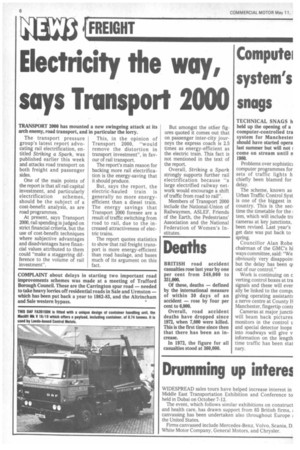Electricity the way, says Transport 2000
Page 8

If you've noticed an error in this article please click here to report it so we can fix it.
TRANSPORT 2000 has mounted a new swingeing attack at its arch enemy, road transport, and in particular the lorry.
The transport pressure group's latest report advocating rail electrification, entitled Striking a Spark, was published earlier this week and attacks road transport on both freight and passenger sides.
One of the main points of the report is that all rail capital investment, and particularly electrification schemes, should be the subject of a cost-benefit analysis, as are road programmes.
At present, says Transport 2000, rail spending is judged on strict financial criteria, but the use of cost-benefit techniques where subjective advantages and disadvantages have financial values attributed to them could "make a staggering difference to the volume of rail investment". This, in the opinion of Transport 2000, "would remove the distortion in transport investment", in favour of rail transport.
The report's main reason for backing more rail electrification is the energy-saving that it should produce.
But, says the report, the electric-hauled train is generally no more energyefficient than a diesel train. The energy savings that Transport 2000 foresee are a result of traffic switching from road to rail, due to the increased attractiveness of electric trains.
The report quotes statistics to show that rail freight transport is more energy-efficient than road haulage, and bases much of its argument on this fact. But amongst the other figures quoted it comes out that on passenger inter-city journeys the express coach is 2.5 times as energy-efficient as the electric train. This fact is not mentioned in the text of the report.
Overall, Striking a Spark strongly supports further rail electrification because "a large electrified railway network would encourage a shift of traffic from road to rail".
Members of Transport 2000 include the National 'Union of Railwaymen, ASLEF, Friends of the Earth, the Pedestrians' Association and the National Federation of Women's Institutes.




















































































































































































































